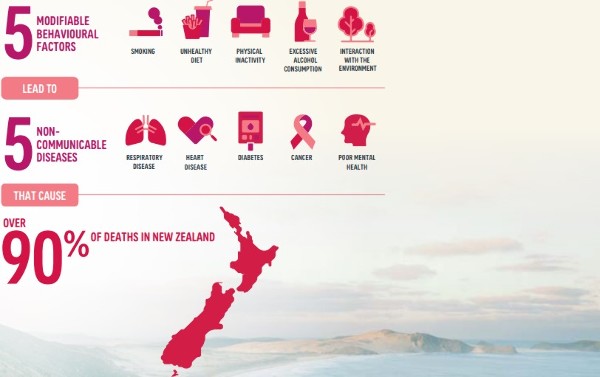AIA's 5590 report; reduce risks - live longer
We all know that two things in life are inevitable - death and taxes - but according to new research, 90% of all New Zealand deaths are linked to behaviours that cause preventable, non-communicable diseases.
Wednesday, October 13th 2021, 6:01AM
by Matthew Martin
AIA NZ has today released its 5590+ Report that breaks down how risk factors and non-communicable diseases (NCDs) cause most of the deaths in New Zealand.
The five risk factors of physical inactivity, poor nutrition, smoking, excess alcohol and environmental interaction, contribute to five common NCDs - cancer, diabetes, respiratory disease, heart disease and poor mental health.
AIA NZ chief executive Nick Stanhope says the case for focusing on health promotion and preventing non-communicable diseases is stronger than ever.
“Non-communicable diseases are the leading cause of preventable death not only in New Zealand but across the globe.
"In 2019, 74% of the world’s total deaths were caused by non-communicable diseases.
"Furthermore, non-communicable diseases took seven places in the top 10 causes of death,” says Stanhope.
He says the research shows more than two-thirds of Kiwis thought Covid-19 was responsible for the most deaths globally in 2020, however, the more insidious threat is an NCD.
Nearly three-quarters of New Zealanders know someone close to them who has suffered from an NCD and a third of Kiwis have suffered from an NCD with more than half being worried they’ll suffer a heart attack or heart condition at some point.
Of those who have suffered from an NCD, a quarter say they could have prevented it with a better understanding of the pre-cursory risk factors and how to prevent them.
“That’s more than 465,000 Kiwis who, by making small lifestyle changes to reduce their risk of disease, could have saved themselves suffering from a non-communicable disease,” Stanhope says.
"It’s imperative we focus on a preventative healthcare mindset to significantly reduce this burden on our families, friends and communities.”
The study also took a hard look at mental health with a third of Kiwis saying they have suffered a period of poor mental health or mental illness in their life, and more than half of Kiwis know someone who has suffered a period of poor mental health or mental illness.
“Mental wellbeing is becoming an increasingly important pillar for Kiwis both individually and as an integral part of business operations," Stanhope says.
The report shows that mental health affects and is affected by, other non-communicable diseases with poor mental health and other NCDs sharing several common causes and outcomes, and can frequently occur in the same person.
For example, depression increases the risk of developing cardiovascular disease at an early age, while cardiovascular disease increases the chance of developing depression.
Many studies also show there is a correlation between depression and an unhealthy diet and smoking - both of which are key risk factors in the 5590 framework.

Environmental factors such as air pollution, climate change, agriculture, and urbanisation also impact peoples' health.
“We cannot thrive in an unhealthy environment, while the environment cannot thrive when our behaviours aren’t healthy,” says Stanhope.
Alarmingly, more than a third of Kiwis are concerned about environmental risk contributing to a non-communicable disease later in life and half of Kiwis are concerned that climate change and poor air quality will affect their health in the future.
However, it's not all bad news with the goal of the 5590 Report being to keep people healthy and reduce the chance of Kiwis developing preventable non-communicable diseases.
“AIA NZ wants to increase peoples’ control over their own health by engaging and empowering individuals and communities to choose healthy behaviours and make changes that reduce the risk of developing non-communicable diseases,” Stanhope says.
"If we can get Kiwis to build healthy habits over time or live in less risky conditions, then we can reduce the incidence of health problems associated with these risk factors.
"In turn, we will create a healthier country and a health system built on prevention as opposed to treatment.”
| « Fidelity aims to take number two spot | Mixed reviews from advisers on FMA regulation » |
Special Offers
Comments from our readers
No comments yet
Sign In to add your comment
| Printable version | Email to a friend |


